

Informalize! Essays on the Political Economy of Urban Form Vol. 1 Edited by Marc Angélil and Rainer Hehl.Berlin: Ruby Press, 2012 English, 144 pages, 10,7 x 14,7 cm, soft coverISBN 978-3-9813436-6-312 EUR Informalize!

Is the first book in the forthcoming Essays on the Political Economy of Urban Form series developed at WERK 11, a research hub of the ETH Zurich bringing together the various fields that have an impact on today’s urban conditions. Edited by Marc Angélil and Rainer Hehl, this collection of four essays presents a cross-section of urban informality drawing on broader theoretical frameworks as well as case studies from Casablanca, Belgrade, and the Global South. Nationalism, Colonialism, and Literature. The resource you are accessing has been identified as secure content.

This site is currently verifying your digital identity. For most web browsers this process is automatic, you will be taken to your original resource upon completion. The verification process is encrypted to protect your digital identity. Social capital. In sociology, social capital is the expected collective or economic benefits derived from the preferential treatment and cooperation between individuals and groups.
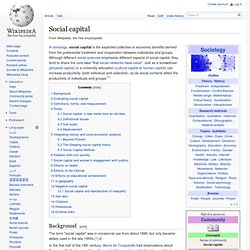
Although different social sciences emphasize different aspects of social capital, they tend to share the core idea "that social networks have value". Just as a screwdriver (physical capital) or a university education (cultural capital or human capital) can increase productivity (both individual and collective), so do social contacts affect the productivity of individuals and groups.[1] Background[edit] The term "social capital" was in occasional use from about 1890, but only became widely used in the late 1990s.[1]
Social capital: civic community and education. Social capital.
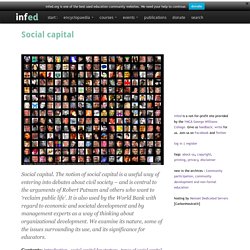
The notion of social capital is a useful way of entering into debates about civil society – and is central to the arguments of Robert Putnam and others who want to ‘reclaim public life’. It is also used by the World Bank with regard to economic and societal development and by management experts as a way of thinking about organizational development. We examine its nature, some of the issues surrounding its use, and its significance for educators. Sense of place. Geographic place[edit] To understand sense of place, the geographic concept of space needs first to be defined.
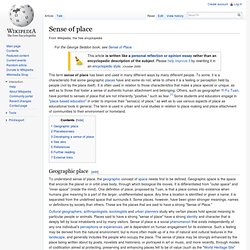
Geographic space is the space that encircle the planet or in orbit ones body, through which biological life moves. It is differentiated from "outer space" and "inner space" (inside the mind). One definition of place, proposed by Tuan, is that a place comes into existence when humans give meaning to a part of the larger, undifferentiated space. Any time a location is identified or given a name, it is separated from the undefined space that surrounds it. Topophilia. Topophilia (From Greek topos "place" and -philia, "love of"[1]) is a strong sense of place, which often becomes mixed with the sense of cultural identity among certain peoples and a love of certain aspects of such a place.
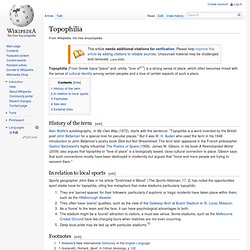
History of the term[edit] Alan Watts's autobiography, In My Own Way (1972), starts with the sentence: "Topophilia is a word invented by the British poet John Betjeman for a special love for peculiar places. " But it was W. H. Auden who used the term in his 1948 introduction to John Betjeman's poetry book Slick but Not Streamlined.
In relation to local sports[edit] G3658-5.pdf (application/pdf Object) Agency (philosophy) Agency may either be classified as unconscious, involuntary behavior, or purposeful, goal directed activity (intentional action).
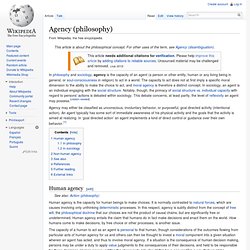
An agent typically has some sort of immediate awareness of his physical activity and the goals that the activity is aimed at realizing. In ‘goal directed action’ an agent implements a kind of direct control or guidance over their own behavior.[1] Human agency is the capacity for human beings to make choices. It is normally contrasted to natural forces, which are causes involving only unthinking deterministic processes. In this respect, agency is subtly distinct from the concept of free will, the philosophical doctrine that our choices are not the product of causal chains, but are significantly free or undetermined. In certain philosophical traditions (particularly those established by Hegel and Marx), human agency is a collective, historical dynamic, rather than a function arising out of individual behavior. Bandura, A. (2001). Social complexity. Ethnography. Participant observation. History and development[edit] Participant observation was used extensively by Frank Hamilton Cushing in his study of the Zuni Indians in the later part of the nineteenth century, followed by the studies of non-Western societies by people such as Bronisław Malinowski,[1] E.E.
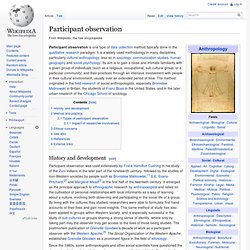
Evans-Pritchard,[2] and Margaret Mead[3] in the first half of the twentieth century. It emerged as the principal approach to ethnographic research by anthropologists and relied on the cultivation of personal relationships with local informants as a way of learning about a culture, involving both observing and participating in the social life of a group. By living with the cultures they studied, researchers were able to formulate first hand accounts of their lives and gain novel insights. Cultural relativism. Compare moral relativism, aesthetic relativism, social constructionism, and cognitive relativism.
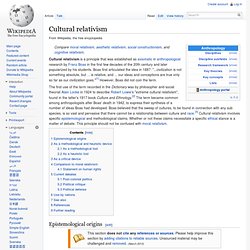
Cultural relativism is a principle that was established as axiomatic in anthropological research by Franz Boas in the first few decades of the 20th century and later popularized by his students. Boas first articulated the idea in 1887: "...civilization is not something absolute, but ... is relative, and ... our ideas and conceptions are true only so far as our civilization goes. "[1] However, Boas did not coin the term.
Epistemological origins[edit] Antipositivism. Community - a review of the theory. Community.
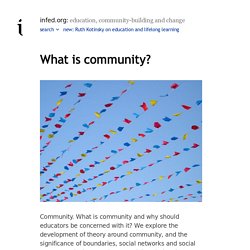
What is community and why should educators be concerned with it? We explore the development of theory around community, and the significance of boundaries, social networks and social norms – and why attention to social capital and communion may be important. contents: approaching the theory of community · community and boundary · community and network · community – norms and habits · social capital and community · communion and community · further reading · references · links · how to cite this article Since the late nineteenth century, ‘the use of the term community has remained to some extent associated with the hope and the wish of reviving once more the closer, warmer, more harmonious type of bonds between people vaguely attributed to past ages’ (Elias 1974, quoted by Hoggett 1997: 5). Before 1910 there was little social science literature concerning ‘community’ and it was really only in 1915 that the first clear sociological definition emerged.
Place. Anthony P. Links. Behavioural Dynamics Institute.